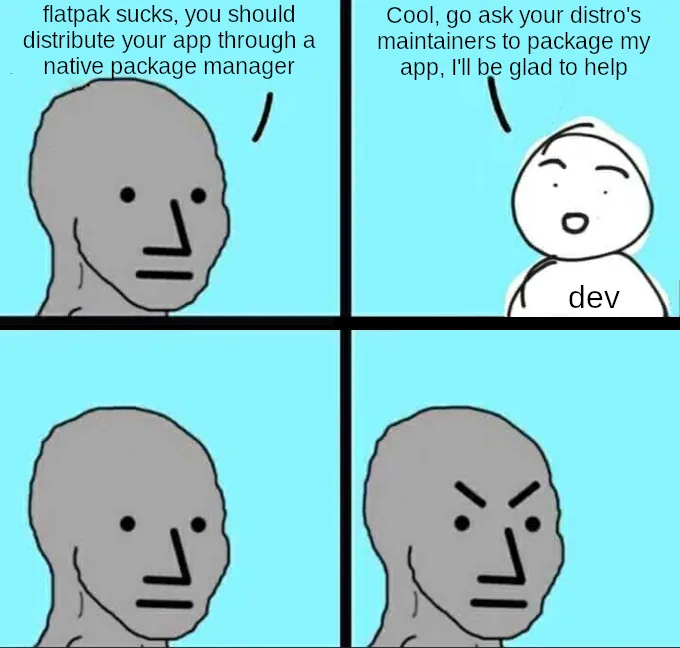this post was submitted on 05 Jul 2024
742 points (93.9% liked)
linuxmemes
21393 readers
1649 users here now
Hint: :q!
Sister communities:
Community rules (click to expand)
1. Follow the site-wide rules
- Instance-wide TOS: https://legal.lemmy.world/tos/
- Lemmy code of conduct: https://join-lemmy.org/docs/code_of_conduct.html
2. Be civil
- Understand the difference between a joke and an insult.
- Do not harrass or attack members of the community for any reason.
- Leave remarks of "peasantry" to the PCMR community. If you dislike an OS/service/application, attack the thing you dislike, not the individuals who use it. Some people may not have a choice.
- Bigotry will not be tolerated.
- These rules are somewhat loosened when the subject is a public figure. Still, do not attack their person or incite harrassment.
3. Post Linux-related content
- Including Unix and BSD.
- Non-Linux content is acceptable as long as it makes a reference to Linux. For example, the poorly made mockery of
sudoin Windows. - No porn. Even if you watch it on a Linux machine.
4. No recent reposts
- Everybody uses Arch btw, can't quit Vim, and wants to interject for a moment. You can stop now.
Please report posts and comments that break these rules!
Important: never execute code or follow advice that you don't understand or can't verify, especially here. The word of the day is credibility. This is a meme community -- even the most helpful comments might just be shitposts that can damage your system. Be aware, be smart, don't fork-bomb your computer.
founded 1 year ago
MODERATORS
you are viewing a single comment's thread
view the rest of the comments
view the rest of the comments

You don't need the distro to package your sodtware through their package management systems though. Apt and dnf repositories are extensible, anyone can publish. If you go to copr or ppa you can have a little extra help too, without distro maintainers.
The headache comes up when multiple third party repositories start conflicting with each other when you add enough of them, despite they're best efforts. This scenario starts needing flatpack, which can, for example concurrently provide multiple distinct library versions installed that traditionally would conflict with each other. This doesn't mean application has to bundle the dependency, that dependency can still be external to the package and independently updated, it just means conflicts can be gracefully handled.
Which is traditionally why you needed the distro to package your software...
Depends on if you stick to distro provided dependencies, then you are generally good, unless a third party repo decided to supersede that dependency.
I have spent a long time carefully packaging as a third party repository and it's generally doable. Just sometimes another repository isn't as careful and blows away the distribution provided libraries.